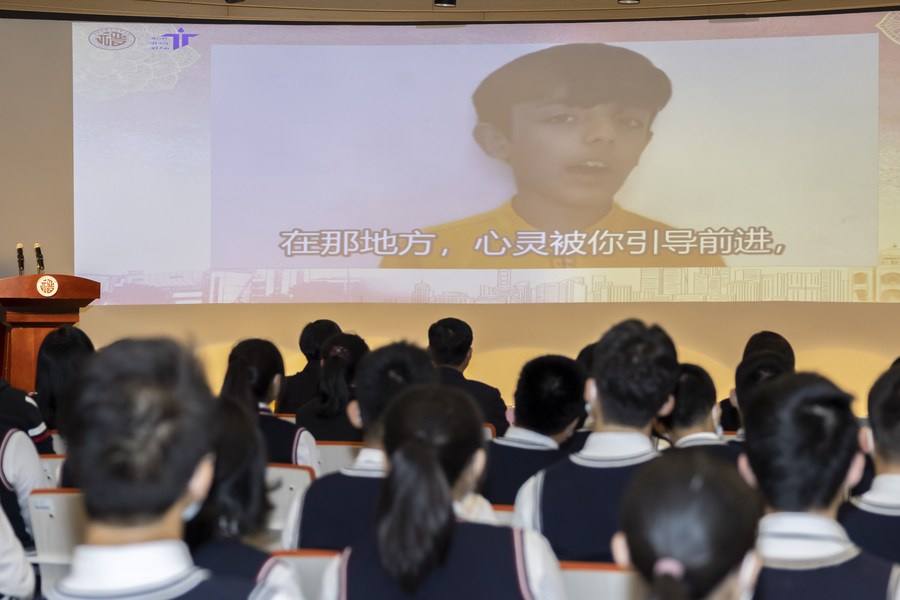
People from both sides, especially the young generation, can carry forward the great spirit of Indian polymath Gurudev Rabindranath Tagore to strengthen bilateral relations, said Chinese Consul General in Mumbai Kong Xianhua.
Kong made the comments in Bengaluru on April 13, where he inaugurated a photo exhibition commemorating the Indian poet, philosopher, and Nobel Prize winning writer’s trip to China in 1924.
According to the organizers, the exhibition attempts to look at some of the deep literary, artistic, political and spiritual exchange that took place in the 1920s as a basis for us to study and build on today
The 10-day exhibition — titled Rabindranath Tagore: The Spirit of Asia and Our Human Future — highlights the cultural and artistic connections formed between India and China during Tagore’s visit, including pictures of him with various Chinese scholars.
Kong said he was touched by Tagore’s statement that “India has been one of China’s extremely close relatives, and China and India have been enjoying time-honored and affectionate brotherhood”.
Tagore’s visit to China and the letters between him and Chinese scholars show a strong empathy between China and India, Kong noted. “This empathy is so deeply rooted and commonly shared that it could draw all of us together again after a whole century.”
According to the organizers, the exhibition attempts to look at some of the deep literary, artistic, political and spiritual exchange that took place in the 1920s as a basis for us to study and build on today.
The exhibition showcases Tagore’s friendships with Chinese scholar Tan Yun Shan and eminent Chinese painter Xu Beihong, who visited Tagore in India in 1939 and stayed for over a year.
Tagore hosted Xu at Santiniketan in West Bengal, a town that Xu described as a “place which corresponds to my ideal of a center of art and culture”.
“The whole world should make a pilgrimage here in order to breathe the joyful atmosphere of creative endeavor undertaken here under the direct inspiration of India’s great poet,” Xu said.
“My visit here is that of a pilgrim. I have come not to give but to receive the great gifts that India may have to bestow upon my country and people as she did in the days gone by.”
Tan Yun Shan, who had met Tagore in Singapore in 1927, also visited Santiniketan. It was there in 1937 that he founded the Cheena Bhavana, the first center of Chinese studies in India, at Visva-Bharati University.
Tan would live out his last days in India after devoting his life to establishing cultural ties between China and India. The exhibition is dedicated to him, the organizers said.
Elsewhere, the exhibition shows photos of Tagore with Lin Huiyin, a pioneer of female architects in modern China, and romantic poet Xu Zhimo. Lin and Xu acted as hosts and interpreters during Tagore’s April 1924 trip.
Today, 100 years since Tagore’s visit and facing profound changes unseen in a century, China and India have the privilege of maintaining healthy economic development and social stability, Consul General Kong said.
Last year, the Chinese consulate general office in Mumbai issued nearly 50,000 visas to Indians, while bilateral trade between China and India has reached a record high of $136 billion and is continuing to grow
For thousands of years, China and India have engaged in a continuous and reciprocal exchange of culture and commerce, Kong said, adding “we fought together and worked together.”
China-India relations will not remain at a low ebb for long, he added.
Kong said he believes China and India have no reason not to go side by side on the way to achieve the great rejuvenation of both nations and build a community with a shared future for mankind.
Last year, the Chinese consulate general office in Mumbai issued nearly 50,000 visas to Indians, while bilateral trade between China and India has reached a record high of $136 billion and is continuing to grow.
“We have been trying our best and will continue to enhance the bilateral friendship between China and India,” Kong said.
Nandita Chaturvedi, one of the organizers of the exhibition, said that they wanted to use the centenary of the event “to talk about Tagore’s vision for peace in Asia”.
“Through organizing this event we were moved by how strong his influence still remains in China. Tagore has been the second most translated author in the country after Shakespeare,” Chaturvedi said.
“If you look at modern Chinese literature, almost all the figures are heavily influenced by Tagore. We feel that this history of cultural exchange that happened is very important during this time also,” she added.
Sreemati Chakrabarti, chairperson of the Institute of Chinese Studies and former professor of Chinese Studies in the Department of East Asian Studies at the University of Delhi, welcomed the exhibition.
Chakrabarti said it was a step towards strengthening people-to-people relations and enhances the knowledge about each other, which is at present not adequate enough.
Perhaps this can have a positive impact on the foreign policy of the two nations, Chakrabarti added.
Before visiting this exhibition, Suraj Vasisht, a visitor, was not aware that Tagore had established a rich literary and artistic exchange between the two countries and many of Tagore's artistic creations are popular in China also.
This exhibition is a reminder of this rich artistic exchange and creating awareness among the new generation about this artistic exchange is important, Suraj said.
The exhibition not only revisits a century-old legacy but also seeks to inspire contemporary solutions through Tagore’s visionary contributions to art and literature, said Arakali Venkatesh Prasad, secretary of Indian Institute of World Culture.
“Tagore significantly influenced the cultural and intellectual landscape between China and India. As the first modern Indian ambassador to China, Tagore’s contributions came against a backdrop of colonial rule experienced by both nations,” the secretary said.
The writer is a freelance journalist for China Daily.


